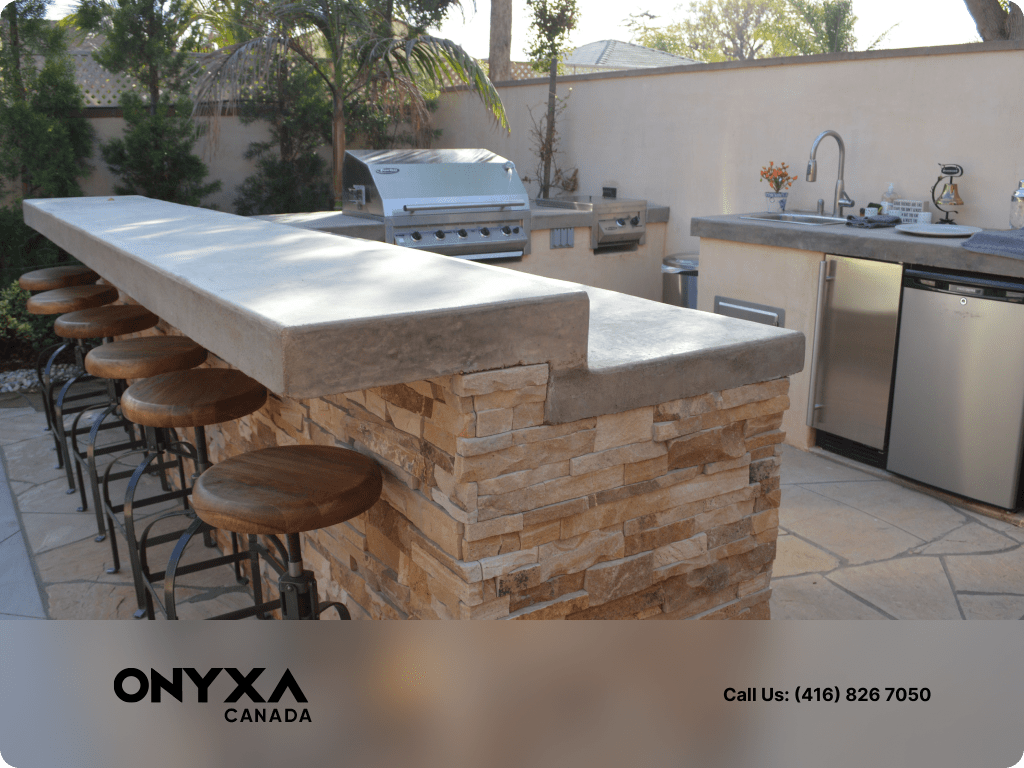Outdoor Countertop Ideas: Choosing the Perfect Material
When designing an outdoor space, selecting the ideal countertop material is a critical decision. Outdoor countertops must not only be visually appealing but also capable of enduring exposure to the elements.
In this comprehensive guide, we will explore various outdoor countertop materials, providing an in-depth explanation of each material’s characteristics before discussing the pros and cons of each option.
We’ll start by examining porcelain slabs as the first material.
#1. Porcelain Slabs
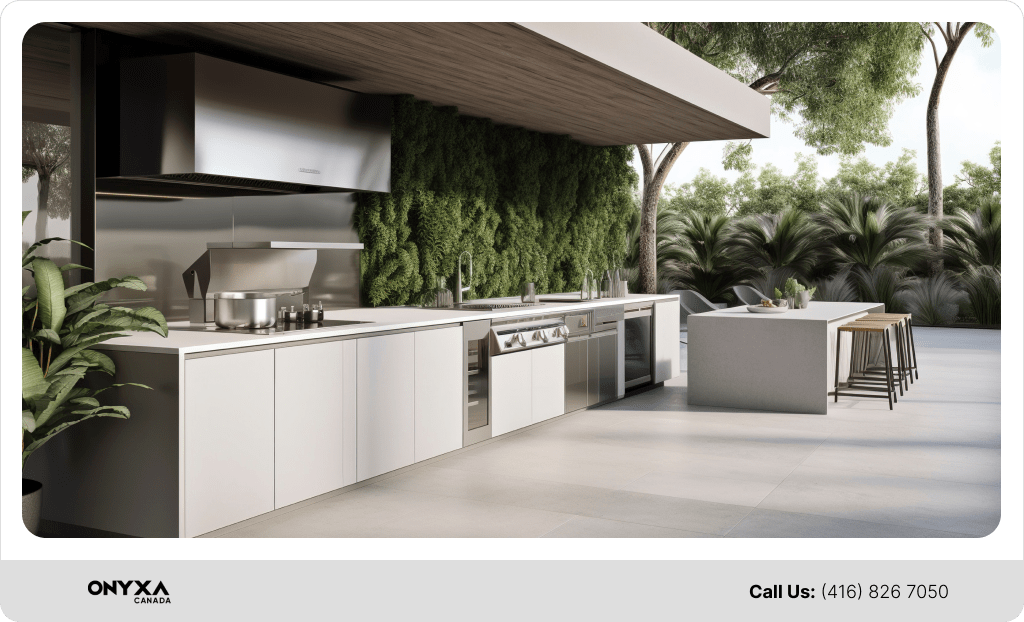
When you think of “porcelain,” what typically comes to mind? For many, porcelain is synonymous with durability and low maintenance, making it an ideal choice for a wide range of projects.
While this perception remains accurate, there’s an innovative and transformative use for porcelain that’s making waves: countertops.
With porcelain’s impressive list of advantages, it’s no wonder that porcelain slab countertops have been the preferred choice in Europe and China for quite some time and are now gaining popularity in North America.
Keep reading to explore the numerous benefits that porcelain slab countertops offer and why you should seriously consider incorporating them into your upcoming outdoor countertop project.
Pros of Porcelain Slabs:
- Durability: Porcelain slabs are known for their exceptional durability, making them a perfect choice for outdoor use. They can withstand extreme temperature fluctuations, UV exposure, and moisture without fading, cracking, or warping.
- Low Maintenance: Outdoor countertops can get dirty and stained quickly. Porcelain slabs are incredibly easy to clean and maintain. A simple wipe with a damp cloth or mild detergent is usually sufficient to keep them looking pristine.
- Aesthetic Appeal: Porcelain slabs come in a wide range of colors, patterns, and textures, allowing you to create the outdoor kitchen or dining area of your dreams. They can mimic the appearance of natural stone, wood, concrete, or even exotic materials, providing limitless design possibilities.
- Resistance to Stains and Chemicals: Porcelain is naturally resistant to stains, making it an ideal surface for cooking and dining outdoors. It is also highly resistant to chemicals, ensuring that spills and splashes from cooking won’t damage the countertop.
- UV Resistance: The sun’s harsh UV rays can cause materials to fade and deteriorate over time. Porcelain slabs are UV-resistant, meaning they won’t lose their color or integrity when exposed to sunlight.
Cons of Porcelain Slabs:
- Cost: Porcelain slabs can be more expensive than some other outdoor countertop materials, making them a higher initial investment.
- Installation: Proper installation may require professional expertise due to their large and heavy nature.
Porcelain Slabs in Outdoor Kitchens
One of the most popular uses for porcelain slabs in outdoor spaces is in outdoor kitchens. The combination of durability, low maintenance, and aesthetic appeal makes porcelain slabs an excellent choice for countertops, backsplashes, and even outdoor kitchen islands.
Tips for Using Porcelain Slabs for Outdoor Countertops
- Select the Right Porcelain: Choose high-quality, outdoor-rated porcelain slabs designed to withstand exposure to the elements. Ensure that they have proper UV resistance and are suitable for outdoor use.
- Proper Installation: Hire a professional installer experienced in working with porcelain slabs. Proper installation is crucial for durability and longevity. Ensure the substrate is stable and correctly prepared.
- Sealing and Waterproofing: While porcelain is naturally resistant to moisture, consider applying a high-quality sealer to enhance its water repellency. This helps prevent staining and moisture absorption, especially in regions with heavy rainfall.
- Edge Profiles: Discuss edge profiles with your installer. Porcelain slabs can have various edge treatments, so choose one that complements your outdoor design and safety needs.
- Color Selection: Porcelain slabs come in a wide range of colors and patterns. Select a color and pattern that coordinates with your outdoor space’s overall aesthetics.
- Maintenance and Cleaning: While porcelain is low-maintenance, regular cleaning is still necessary. Use a mild detergent and a soft cloth or sponge to clean the surface. Avoid abrasive cleaners or scouring pads, as they can damage the finish.
- Avoid Heat Exposure: Porcelain slabs can handle hot pots and pans, but it’s best to use trivets or hot pads to prevent thermal shock and potential damage.
- Regular Inspections: Periodically inspect the countertops for any signs of damage, such as cracks or chips. Address any issues promptly to prevent further damage.
- Avoid Heavy Impact: While porcelain is durable, heavy impacts from falling objects can chip or crack the surface. Take precautions to prevent such accidents.
- Consider Edge Profiles: Porcelain slabs can have various edge profiles. Discuss the options with your installer and choose one that complements your outdoor design and safety needs.
- Winter Precautions: If you live in a region with freezing temperatures, ensure your porcelain slabs are suitable for cold climates. Porcelain’s low water absorption helps, but proper sealing and preventive measures are crucial.
- Plan for Expansion and Contraction: Porcelain slabs can expand and contract with temperature changes. Discuss expansion joint placement with your installer to prevent cracking or warping.
Design Ideas for Outdoor Porcelain Slab Countertops
- Modern Minimalism: Create a contemporary outdoor kitchen with sleek, large-format porcelain slabs in neutral colors like gray or white. Add a waterfall edge for a seamless look, and pair it with stainless steel appliances for a modern touch.
- Natural Stone Elegance: Achieve the timeless charm of natural stone with porcelain slabs that mimic materials like marble or granite. Opt for a textured finish for authenticity and pair with wooden elements for warmth.
- Artistic Mosaic Accents: Elevate your outdoor space with porcelain slabs featuring intricate mosaic or patterned designs. Keep the surroundings simple to let the slabs shine, and introduce vibrant outdoor furnishings to match the patterns.
#2. Stone
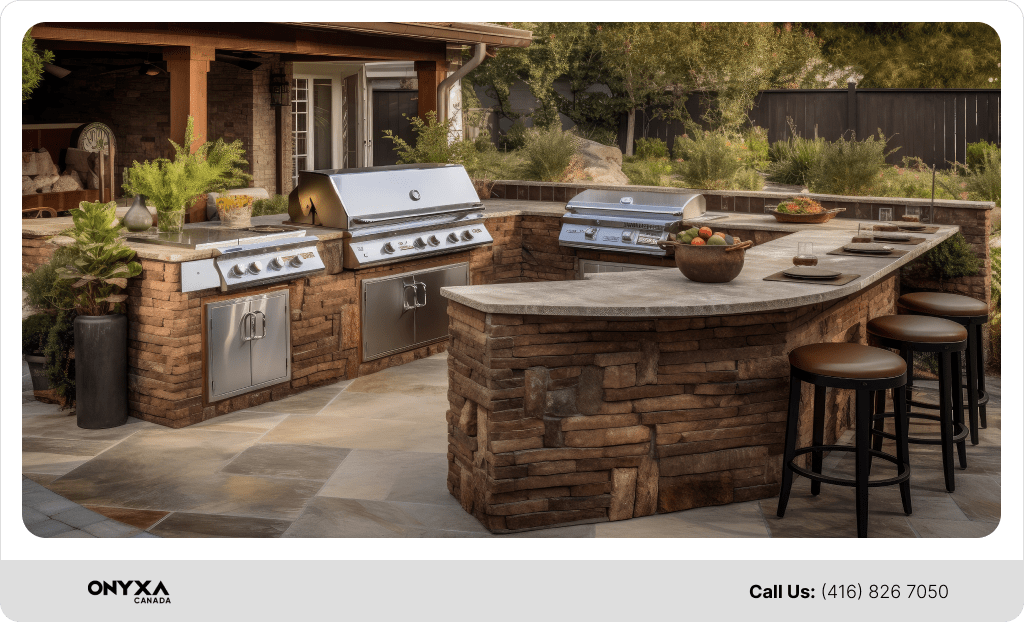
Using stones has its advantages – it’s versatile in design and extremely durable, a real win-win! Many homeowners decorate their outdoor living areas with stones, but they often overlook the idea of using them for outdoor kitchen countertops.
What’s fantastic about landscape stones is not just the variety of colors they come in, but also the different textures available. This flexibility lets you get creative when designing your outdoor kitchen countertops. You can match your countertop with your patio slabs for a cohesive look or choose a unique stone that becomes a standout feature on its own. The choice is all yours!
Moreover, landscape stones are known for their durability. When you’re picking an outdoor countertop, the main concern is whether it can handle the challenges of outdoor weather all year round. Landscape stones excel in this area, offering long-lasting strength and resistance to color fading over time. It’s a choice that combines both style and substance for your outdoor space.
Pros of Stone:
- Natural Aesthetic: Landscape stones provide a rustic and natural look that blends seamlessly with outdoor environments, making them ideal for creating an organic and harmonious outdoor space.
- Variety of Options: There’s a wide variety of landscape stones available, including flagstone, bluestone, and slate, each with its unique colors, textures, and patterns. This allows for creative and customized designs.
- Cost-Effective: Landscape stones are often more affordable than materials like granite or quartz, making them a budget-friendly choice for outdoor projects.
- Heat Resistance: These stones can handle high temperatures, making them suitable for outdoor cooking areas and grilling stations.
- Low Maintenance: Landscape stones are generally low maintenance and require minimal cleaning and upkeep to maintain their appearance.
Cons of Stone:
- Lack of Uniformity: The natural variations in color and pattern in landscape stones can make it challenging to achieve a uniform or consistent look across your countertop.
- Porosity: Many landscape stones are porous and can absorb liquids, which may lead to staining if not properly sealed and maintained.
- Uneven Surface: The surface of landscape stones can be irregular and uneven, making it less conducive to tasks that require a smooth and level countertop.
- Durability: While durable, landscape stones may be more prone to chipping, cracking, and scratching compared to materials like granite or quartz.
- Limited DIY Options: Installing landscape stone countertops can be challenging, particularly if you’re not experienced with masonry work. It often requires professional installation.
- Sealing and Maintenance: Proper sealing and periodic maintenance are essential to prevent staining and preserve the stone’s appearance over time.
#3. Granite
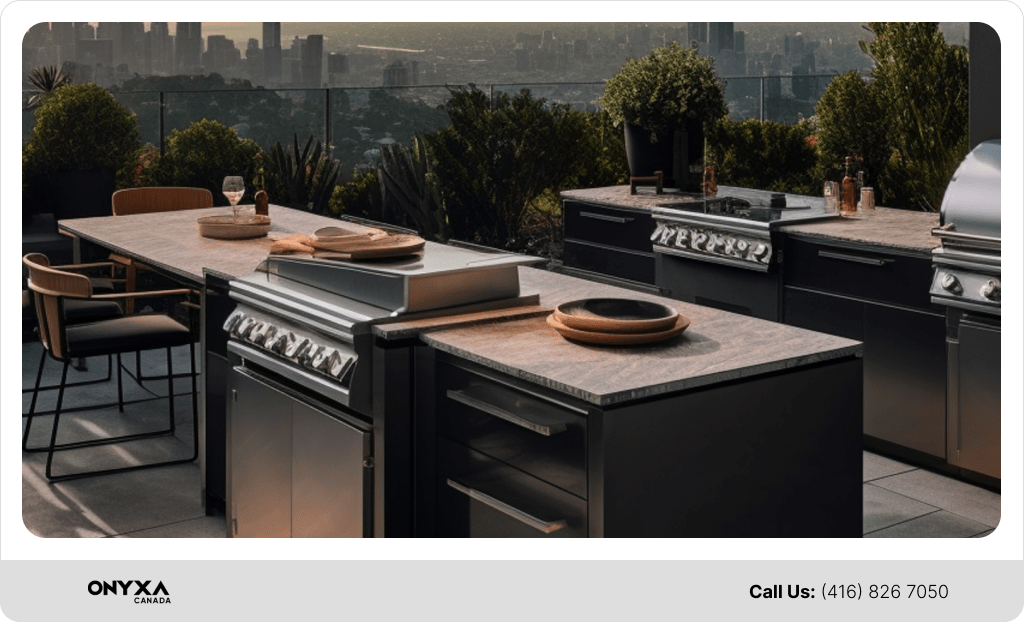
When you’re setting up your outdoor kitchen, you need to think about what appliances, tiles, and countertops to use. Granite is an interesting choice because it’s known for being super tough, one of the hardest things on Earth. But here’s the twist – you’re also advised to seal it to keep it looking good and stain-free.
Now, here’s the deal: Granite can still be your outdoor kitchen superstar. Yes, it might need a little extra care, like getting sealed regularly. But it can handle everything from extreme heat to icy cold, the blazing sun, and even a good old rain shower without a hitch.
So, if you want a countertop that can take a beating outdoors and still look top-notch, granite could be the smart choice for your outdoor kitchen.
Pros of Granite Outdoor Kitchen Countertops:
- Durability: Granite is exceptionally durable and can withstand outdoor elements, including extreme temperatures, sunlight, and moisture.
- Heat Resistance: It’s highly heat-resistant, making it suitable for outdoor cooking areas with hot grills and cooktops.
- Aesthetic Appeal: Granite offers a natural and timeless beauty, enhancing the visual appeal of your outdoor kitchen.
- Variety of Colors and Patterns: There’s a wide range of granite colors and patterns to choose from, allowing you to customize your outdoor space.
- Stain Resistance (with Sealing): When properly sealed, granite becomes highly stain-resistant, making it easier to clean and maintain.
Cons of Granite Outdoor Kitchen Countertops:
- Sealing Required: Granite countertops require periodic sealing to maintain their appearance and resist stains effectively.
- Cost: Granite can be more expensive than some other outdoor countertop materials.
- Heavyweight: Granite is heavy, which may require extra structural support for your outdoor kitchen.
- Limited DIY Installation: Professional installation is often recommended due to the weight and intricacies of granite countertop placement.
- Not Completely Immune to Damage: While tough, granite can still be chipped or cracked by heavy impacts or sharp objects.
- Color Variation: Natural variations in color and pattern may be present in granite slabs, which may or may not be a desired feature.
#4. Concrete
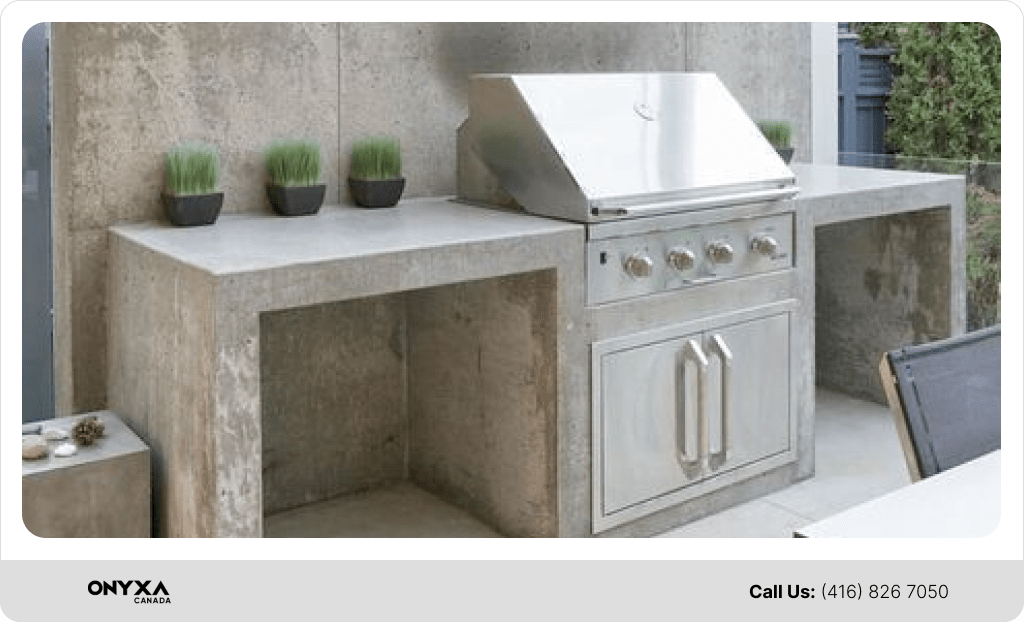
Concrete countertops have emerged as a highly practical and visually appealing choice for outdoor kitchens, successfully blending functionality and aesthetics. These versatile surfaces bring numerous advantages to the table for those seeking to elevate their outdoor cooking and entertainment experiences.
One of the standout features of concrete countertops is their remarkable durability. They can withstand the most challenging outdoor conditions, from scorching summer heat to damp, rainy weather, all while retaining their functionality and appearance. This resilience makes concrete an excellent option for your outdoor culinary endeavors.
Moreover, concrete countertops offer boundless design flexibility. You can customize them to match your unique style and preferences, whether you favor a sleek, contemporary appearance or a more textured, rustic finish. The adaptability of concrete allows for the incorporation of various colors, patterns, and decorative elements, enhancing the visual allure of your outdoor kitchen.
Pros of Concrete Countertops:
- Durability: Concrete countertops are exceptionally durable and can withstand heavy use and wear over time.
- Design Flexibility: They offer extensive design flexibility, allowing for customization in terms of shape, color, texture, and pattern.
- Unique Appearance: Concrete countertops have a distinct, industrial-chic appearance that can add character and style to any space.
- Heat Resistance: They are highly heat-resistant, making them suitable for placing hot pots and pans directly on the surface.
- Personalization: Concrete countertops can incorporate various decorative elements like embedded stones, glass, or other materials for a personalized touch.
- Seamless Integration: They can be seamlessly integrated with sinks and other features for a sleek, cohesive look.
Cons of Concrete Countertops:
- Maintenance: Concrete countertops require regular sealing to prevent staining and damage, which adds to their upkeep.
- Weight: They are heavy, which may necessitate extra structural support in some cases.
- Vulnerability to Cracks: While durable, concrete can develop hairline cracks over time, which some people find undesirable.
- Cost: Custom concrete countertops can be relatively expensive due to the labor-intensive nature of their fabrication and installation.
- Limited Resistance to Acidic Substances: Concrete is vulnerable to damage from acidic substances like vinegar and lemon juice, which can etch the surface.
- Initial Curing Time: Concrete countertops may require an extended curing time before they can be used, which can be inconvenient during installation.
#5. Quartz
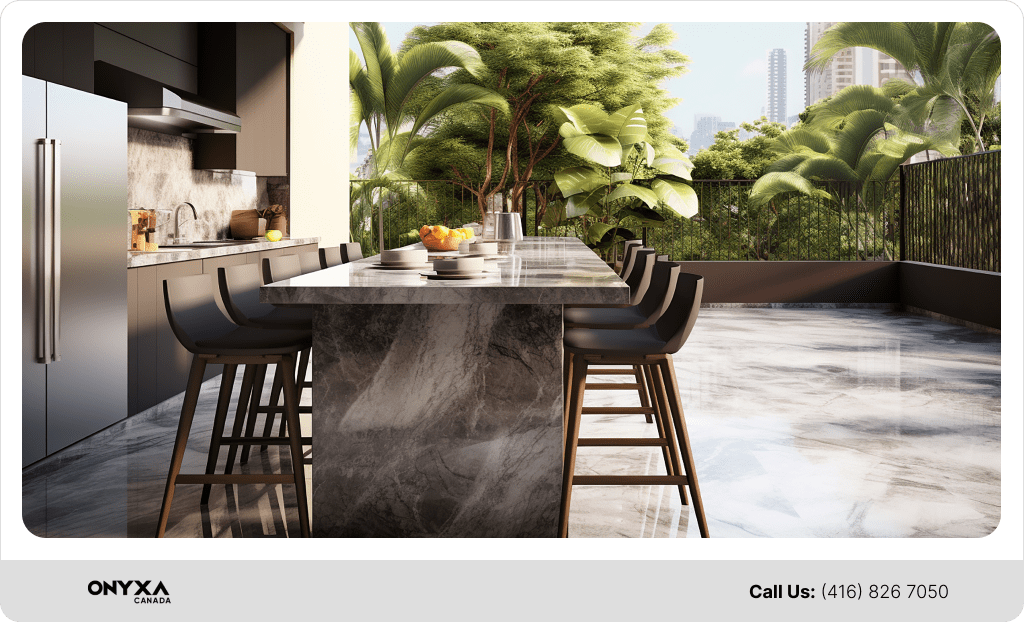
Quartz countertops have gained popularity among homeowners for their affordability, stylish appearance, and remarkable durability. They’re a go-to choice for indoor kitchens, but can they handle the great outdoors? Well, here’s the scoop.
Quartz countertops are designed primarily for indoor use. They excel in withstanding the rigors of everyday kitchen activities, but they’re not built to thrive in an outdoor setting. Why, you ask?
It all comes down to their vulnerability to the elements. Outdoor exposure, especially to UV rays, can lead to color fading and a decrease in overall durability over time. Rain, snow, and other weather conditions can also take a toll, potentially weakening the material.
In a nutshell, quartz is your indoor kitchen champ. If you’re planning an outdoor kitchen, it’s best to explore other materials specifically designed to endure the outdoor elements and maintain their quality and appearance.
Pros of Quartz Outdoor Kitchen Countertops:
- Durability: Quartz is highly durable and resistant to scratches, stains, and impact, making it well-suited for outdoor use.
- Low Maintenance: Quartz countertops are relatively low maintenance, requiring only regular cleaning to maintain their appearance.
- UV Resistance: Some quartz countertops are engineered to be UV-resistant, reducing the risk of color fading when exposed to sunlight.
- Variety of Colors and Designs: Quartz offers a wide range of color and design options, allowing you to customize your outdoor kitchen’s aesthetics.
- Non-Porous: Quartz is non-porous, which means it doesn’t absorb liquids, making it less prone to staining and bacterial growth.
Cons of Quartz Outdoor Kitchen Countertops:
- Cost: Quartz countertops can be more expensive than some other outdoor countertop materials.
- Not All Quartz is Suitable: Not all quartz countertops are designed for outdoor use, and using indoor-grade quartz outdoors can lead to deterioration over time due to UV exposure.
- Heat Resistance: While quartz is generally heat-resistant, extreme temperature fluctuations in outdoor environments can potentially cause thermal shock and damage.
- Limited DIY Installation: Quartz countertop installation is often best handled by professionals, limiting DIY options for some homeowners.
- Susceptibility to Scratches: Although quartz is generally scratch-resistant, it can still be scratched by sharp objects or heavy-duty outdoor cooking equipment.
Which is the best choice for Outdoor Kitchens?
When it’s time to decide on the ideal outdoor kitchen countertop material for your home, take into account the location, proximity to food, and the inherent properties of the material. If you’re drawn to the idea of a Porcelain slab countertop, ensure it’s adequately shielded from the sun and rain. If you’d rather keep your outdoor kitchen exposed, consider investing in a Stone product, like Granite or Concrete. Just be sure to seal them to guard against moisture and staining regularly.
For bustling outdoor kitchens, remember that mold, mildew, and moisture can penetrate porous materials. It may be wiser to opt for a nonporous option, such as Glass, to simplify cleaning and sanitization before and after every meal. If cost is your primary concern, then Tiles can be a viable choice, although they may not fare well in cold climates.
Ultimately, the best type of outdoor kitchen countertop depends on your outdoor kitchen setup, environmental resistances, maintenance requirements, cost, and personal preference. Weigh these factors carefully in selecting the right outdoor kitchen countertop material for your home. Please note that Quartz is generally not recommended for outdoor kitchens due to its vulnerability to weather-related damage and exposure.
Remember, you’re not alone in this decision. If you’re feeling overwhelmed, Onyxa is here to help. Their experts can guide you through the options so that you can pick the perfect countertop for your style, life, and wallet. Your kitchen will be the ideal blend of beauty and functionality with their assistance.
Or call us: +1 (416) 854.8645
Related Articles:
Related: Luxury home renovation ideas
